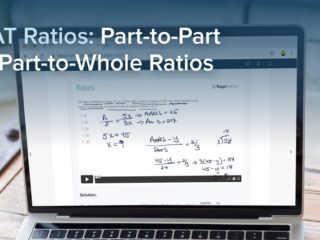Last Updated on September 30, 2024
Solution:
We can use some actual numbers to solve this problem. We see that p/q is less than 1. It follows that we have a proper fraction, where q is greater than p. Let’s let p = 1 and q = 4; thus p/q = 1/4.
We now consider each answer choice:
Choice A: sqrt (p/q) = sqrt (1/4) = ½, which is less than 1. Choice A is not correct.
Choice B: p/q^2 = 1 / 4^2 = 1 / 16, which is less than 1. Choice B is not correct.
Choice C: p/2q = 1/ (2)(4) = 1/8, which is less than 1. Choice C is not correct.
Choice D: q/p^2 = 4/1^2, which is greater than 1. This could be the answer.
Choice E: q/p = 4/1, which is greater than 1. This could be the answer.
Choices D and E work for the fraction ¼. Let’s now consider additional values for the original fraction p/q, such as p = 3 and q = 4.
Choice D now becomes q/p^2 = 4/3^2 = 4/9, which is less than 1. Thus, we can now eliminate Choice D.
Choice E now becomes q/p = 4/3, which is greater than 1. Thus, Choice E is correct. In fact, we can see that no matter the value of p or q, if p/q is less than 1, then its reciprocal, q/p will always be greater than 1.
Answer: E



